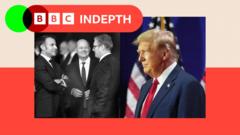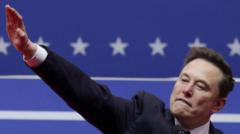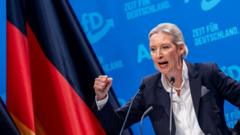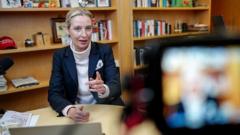In an unprecedented move, former German Chancellor Angela Merkel has voiced her concerns over Friedrich Merz's recent decision to collaborate with the far-right Alternative for Germany (AfD) on a parliamentary motion.
Merkel's Bold Critique of CDU Leadership Amid Far-Right Collaboration
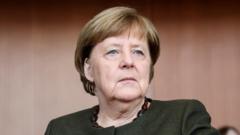
Merkel's Bold Critique of CDU Leadership Amid Far-Right Collaboration
Former Chancellor Angela Merkel publicly criticizes the CDU leader for a controversial motion supported by the far-right.
Merkel's pointed remarks followed a tumultuous vote in the Bundestag, where a CDU motion regarding stricter immigration rules gained the backing of AfD members. This unexpected alliance has sparked outrage and concern within the political landscape, prompting Merkel to intervene in an attempt to realign her party’s direction.
In a press release, Merkel accused Merz of violating a commitment he made last November to avoid engaging with the AfD, emphasizing the importance of maintaining a united front against extremist elements in German politics. "It is vital for all democratic parties to work together to prevent the rise of far-right influence in our legislative process," she stated, referencing the need for collective action against xenophobia and violence, as evidenced by recent attacks in Magdeburg and Aschaffenburg.
This intervention is particularly striking given that Merkel has largely stayed silent since stepping down from her role in 2021. Her criticism of Merz, a figure with whom she shares a complicated history, is expected to intensify tensions within the CDU as he prepares to present new legislation with potential AfD backing, thereby breaching a longstanding political taboo in Germany.
Current Chancellor Olaf Scholz also condemned the move, labeling it an "unforgivable mistake" and reiterating the necessity for democratic cohesion against far-right ideologies that threaten societal values established since the post-World War II era. As the political climate in Germany shifts, Merkel's outspoken position may significantly impact the upcoming elections and the future trajectory of the CDU.
The unfolding situation in the Bundestag highlights a pivotal moment in German politics, as traditional alliances appear to shift and surface tensions threaten to reshape the political conversations moving forward.
In a press release, Merkel accused Merz of violating a commitment he made last November to avoid engaging with the AfD, emphasizing the importance of maintaining a united front against extremist elements in German politics. "It is vital for all democratic parties to work together to prevent the rise of far-right influence in our legislative process," she stated, referencing the need for collective action against xenophobia and violence, as evidenced by recent attacks in Magdeburg and Aschaffenburg.
This intervention is particularly striking given that Merkel has largely stayed silent since stepping down from her role in 2021. Her criticism of Merz, a figure with whom she shares a complicated history, is expected to intensify tensions within the CDU as he prepares to present new legislation with potential AfD backing, thereby breaching a longstanding political taboo in Germany.
Current Chancellor Olaf Scholz also condemned the move, labeling it an "unforgivable mistake" and reiterating the necessity for democratic cohesion against far-right ideologies that threaten societal values established since the post-World War II era. As the political climate in Germany shifts, Merkel's outspoken position may significantly impact the upcoming elections and the future trajectory of the CDU.
The unfolding situation in the Bundestag highlights a pivotal moment in German politics, as traditional alliances appear to shift and surface tensions threaten to reshape the political conversations moving forward.









